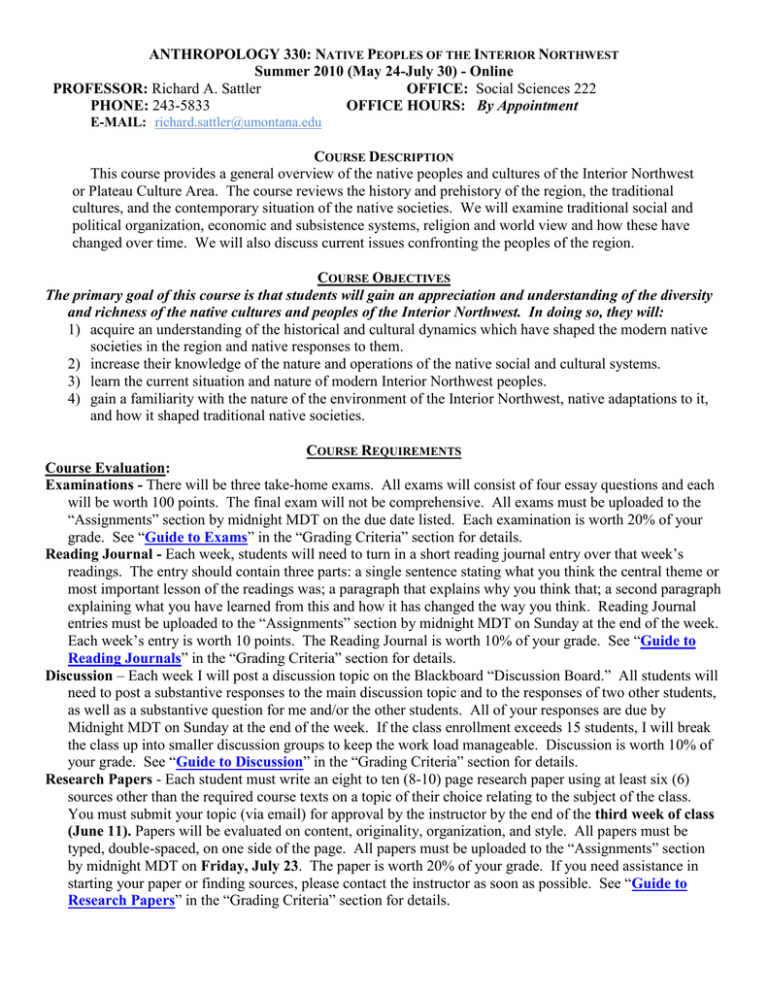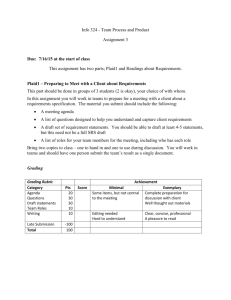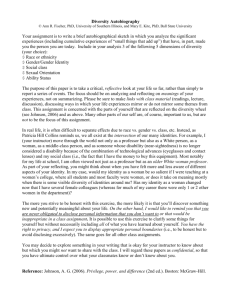ANTHROPOLOGY 330: N P I N
advertisement

ANTHROPOLOGY 330: NATIVE PEOPLES OF THE INTERIOR NORTHWEST Summer 2010 (May 24-July 30) - Online PROFESSOR: Richard A. Sattler OFFICE: Social Sciences 222 PHONE: 243-5833 OFFICE HOURS: By Appointment E-MAIL: richard.sattler@umontana.edu COURSE DESCRIPTION This course provides a general overview of the native peoples and cultures of the Interior Northwest or Plateau Culture Area. The course reviews the history and prehistory of the region, the traditional cultures, and the contemporary situation of the native societies. We will examine traditional social and political organization, economic and subsistence systems, religion and world view and how these have changed over time. We will also discuss current issues confronting the peoples of the region. COURSE OBJECTIVES The primary goal of this course is that students will gain an appreciation and understanding of the diversity and richness of the native cultures and peoples of the Interior Northwest. In doing so, they will: 1) acquire an understanding of the historical and cultural dynamics which have shaped the modern native societies in the region and native responses to them. 2) increase their knowledge of the nature and operations of the native social and cultural systems. 3) learn the current situation and nature of modern Interior Northwest peoples. 4) gain a familiarity with the nature of the environment of the Interior Northwest, native adaptations to it, and how it shaped traditional native societies. COURSE REQUIREMENTS Course Evaluation: Examinations - There will be three take-home exams. All exams will consist of four essay questions and each will be worth 100 points. The final exam will not be comprehensive. All exams must be uploaded to the “Assignments” section by midnight MDT on the due date listed. Each examination is worth 20% of your grade. See “Guide to Exams” in the “Grading Criteria” section for details. Reading Journal - Each week, students will need to turn in a short reading journal entry over that week’s readings. The entry should contain three parts: a single sentence stating what you think the central theme or most important lesson of the readings was; a paragraph that explains why you think that; a second paragraph explaining what you have learned from this and how it has changed the way you think. Reading Journal entries must be uploaded to the “Assignments” section by midnight MDT on Sunday at the end of the week. Each week’s entry is worth 10 points. The Reading Journal is worth 10% of your grade. See “Guide to Reading Journals” in the “Grading Criteria” section for details. Discussion – Each week I will post a discussion topic on the Blackboard “Discussion Board.” All students will need to post a substantive responses to the main discussion topic and to the responses of two other students, as well as a substantive question for me and/or the other students. All of your responses are due by Midnight MDT on Sunday at the end of the week. If the class enrollment exceeds 15 students, I will break the class up into smaller discussion groups to keep the work load manageable. Discussion is worth 10% of your grade. See “Guide to Discussion” in the “Grading Criteria” section for details. Research Papers - Each student must write an eight to ten (8-10) page research paper using at least six (6) sources other than the required course texts on a topic of their choice relating to the subject of the class. You must submit your topic (via email) for approval by the instructor by the end of the third week of class (June 11). Papers will be evaluated on content, originality, organization, and style. All papers must be typed, double-spaced, on one side of the page. All papers must be uploaded to the “Assignments” section by midnight MDT on Friday, July 23. The paper is worth 20% of your grade. If you need assistance in starting your paper or finding sources, please contact the instructor as soon as possible. See “Guide to Research Papers” in the “Grading Criteria” section for details. ANTH 330: NATIVE PEOPLES OF THE INTERIOR NORTHWEST Graduate Students: Graduate students are required to write a fifteen to twenty (15-20) page research paper with at least 10 sources on a topic of their choice relating to the subject of the class. Graduate students will be graded on individual academic performance. Extra Credit: Students wishing to earn extra credit may write a 2-4 page critical review of one of the recommended books listed below. Other books may be considered with the consent of the instructor. Reviews are worth up to 20 points each and only two (2) reviews can be accepted per student. See “Guide to Reviews” in the “Grading Criteria” section for details Late Work: Students are expected to turn in all work on the scheduled due date listed in the syllabus. Late work is subject to a 1/3-letter grade penalty per day. No late work will be accepted after the regularly scheduled final examine unless prior arrangements have been made with the instructor. Academic Honesty: The University of Montana expects its students to be academically honest, particularly in regard to plagiarism. “Plagiarism is the representing of another’s work as one’s own.” Both copyright laws and University policies are rigid as concerns plagiarism. Consult the current “Student Conduct Code” for details regarding penalties for plagiarism. Students with Disabilities: If you need special accommodations, you should contact Disability Services for Students to make arrangements and let me know if there is anything I need to be aware of or that I need to do. Access and communications: You can reach me either by email, telephone, or in person in my office. I will normally get back to you on telephone or email within 36 hours 9:00-5:00 MDT Monday-Thursday. You can also post questions to the General Discussion Board. Required Readings: Ackerman, Lillian. A Necessary Balance. Norman: University of Oklahoma Press, 2003. ISBN 9780806134857 Cebula, Larry. Plateau Indians and the Quest for Spiritual Power, 1700-1850. Lincoln, University of Nebraska Press, 2003. ISBN 9780803222434 Hunn, Eugene S. Nch'i Wana, "The Big River": Mid-Columbian Indians and their Land. Seattle: University of Washington Press, 1990. ISBN 9780295971193 ------------------------------------------------------------------------------------------------------------------------------PROVISIONAL COURSE OUTLINE WEEK 1 (May 24-30): ENVIRONMENT, LANGUAGE, & PREHISTORY Introductory Exercise READINGS: Hunn, Introduction-Ch. 3. Discussion WEEK 2 (May 31-June 6): 18th CENTURY CHANGE READINGS: Hunn, Ch 4. Discussion WEEK 3 (June 7-13): SUBSISTENCE & ECONOMY READINGS: Hunn, Ch 5. Discussion WEEK 4 (June 14-20): SOCIAL ORGANIZATION & LIFE CYCLE READINGS: Hunn, Ch 6-7. Discussion WEEK 5 (June 21-27): POLITICAL ORGANIZATION READINGS: Hunn, Ch 8; Cebula, Introduction-Ch 2. June 21 (Mon) FIRST EXAM DUE Discussion WEEK 6 (June 28-July 4): RELIGION AND WORLDVIEW READINGS: Ch 3-Conclusion. WEEK 7 (July 5-11): POST-CONTACT SOCIETIES 2 ANTH 330: NATIVE PEOPLES OF THE INTERIOR NORTHWEST READINGS: Ackerman, Ch. Introduction-3 Discussion WEEK 8 (July 12-18): ALLOTMENT AND AFTERMATH READINGS: Ackerman, Ch. 4 Jul 12 (Mon) SECOND EXAM DUE Discussion WEEK 9 (July 19-25): 20TH CENTURY READINGS: Ackerman, Ch. 5-6 Discussion July 23 (Fri): PAPERS DUE Discussion WEEK 10 (July 25-30): MODERN TRIBES & CONTEMPORARY ISSUES READINGS: Ackerman, “Comparisons, Commentaries, & Conclusions” July 30 (Fri) THIRD EXAM DUE 3





